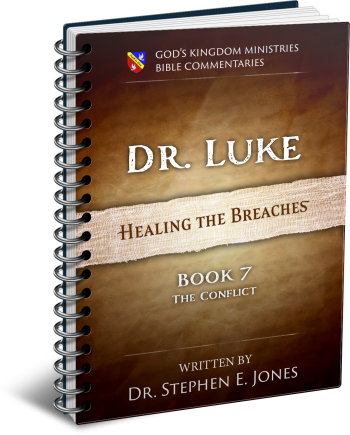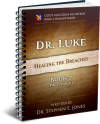Latest Posts
View the latest posts in an easy-to-read list format, with filtering options.

This is a commentary on Luke 18:31 to 21:38 Describing Jesus's trip to Jerusalem and the conflict with the Chief Priest leading to His Crucifixion.
Category - Bible Commentaries

The two donkeys (mother and daughter) represent the two Jerusalems as well as the two occasions for Jesus’ coronation. Paul tells us in Gal. 4:25 and 26 that the two Jerusalems allegorically represent Hagar and Sarah. By extension, the Jews who considered Jerusalem to be their “mother” were represented by Ishmael. The angel in Gen. 16:12 pictured him as “a wild donkey of a man” (pereh awdawm).
This suggests at least one underlying reason Jesus rode into Jerusalem on a donkey. Further, it was a donkey “on which no one yet has ever sat” (Luke 19:30). In other words, the colt was yet unbroken and (in that sense) wild enough to fit the prophetic type as Ishmael’s mother city. Jer. 2:24 calls both Israel and Judah a wild donkey,
24 A wild donkey [pereh awdawm] accustomed to the wilderness, that sniffs the wind in her passion. In the time of her heat who can turn her away? All who seek her will not become weary; in her month they will find her.
The Wycliffe Bible Commentary explains this verse:
“Jeremiah likens his people to wild creatures in heat. Their desire is so great that any mate that wants them can find them without wearing itself. Here the female pursues the male… That snuffeth… turn her away (v. 24). Better, In her heat sniffing the wind! Who can restrain her lust? Her month. That is, her time of heat.”
Jeremiah was saying that the Israelites were turning to foreign gods. Jer. 2:20, 23 says,
20 For long ago I broke your yoke and tore off your bonds; but you said, “I will not serve!” For on every high hill and under every green tree you have lain down as a harlot… 23 How can you say, “I am not defiled, I have not gone after the Baals? Look at your way in the valley! Know what you have done!”
Then in verse 24 the prophet compares them to wild donkeys in hot pursuit of a mate. The people themselves apparently did not understand that they were idolaters. Because they still worshiped at the temple, they disagreed with the prophet, who complained to them in Jeremiah 2:35,
35 Yet you said, “I am innocent; surely His anger is turned away from me.” Behold, I will enter into judgment with you because you say, “I have not sinned.”
The people of Jerusalem in Jesus’ day also believed that they were innocent of idolatry. They were willing to enter the divine court for judgment and claim innocence. The law said that in such controversies, people were to take an oath of innocence, which would settle all controversies (Hebrews 6:16). This is what they did in Jeremiah’s day, and again in Jesus’ day—each time without realizing what they were doing.
Jeremiah was not the first to call Israel a donkey. It really takes us back to that first Passover when Israel was born out of Egypt. Hosea 11:1 says, “out of Egypt I called My son.” God was Israel’s Father, begotten by God Himself, but Egypt was the mother giving birth to Israel. As such, Israel was prophetically an Ishmaelite, because Ishmael’s father was Abraham, but his mother was an Egyptian. As a spiritual Ishmaelite, Israel was a pereh awdawm, a wild donkey man.
The law, however, made provision for such people, showing how they could become spiritual sheep. Exodus 13:13 says,
13 But every first offspring of a donkey you shall redeem with a lamb, but if you do not redeem it, then you shall break its neck; and every first-born of man among your sons you shall redeem.
Sheep did not need to be redeemed. Donkeys, however, needed redemption. Therefore, “every first-born of man among your sons you shall redeem.” Why? Because they were spiritual donkeys in need of redemption. Redemption transformed them into sheep in their prophetic character. The law of redemption shows how any man can be changed from a donkey to a sheep and from Ishmael to Isaac.
Obviously, no donkey can physically turn into a sheep, nor can a physical Ishmaelite change his genealogy and become a descendant of Isaac or Ishmael. This law conveyed spiritual transformation that is revealed with greater clarity in the New Testament. It shows us how to change our identity from the old man of flesh to the new spiritual man. Those who set forth their fleshly identity and claim Adam or Israel as their father are wild donkeys insofar as their relationship with God is concerned.
In Jesus’ day, the city of Jerusalem had become Hagar, and its offspring Ishmael. Their dependence upon the flesh made it so, and their rejection of Christ proved it. But Jesus rode into Jerusalem on a donkey that had never been ridden before—prophetically speaking, a “wild” donkey. He was to be killed as the Passover Lamb a few days later.
Riding on the wild donkey signified that the Lamb was present to redeem Jerusalem (and the whole world), so that all could change their identity from flesh to spirit, from the first Adam to the Last Adam by this spiritual provision set forth in the law.
The ingenious divine plan was thus fulfilled on two levels. First, the entire scene spoke of the divine plan of redemption, whereby the true Lamb of God would take away the sin of the world (John 1:29; 1 John 2:2). But secondly, in order to accomplish this plan, the Lamb had to be slain. This was done by the priests, whose calling it was to offer sacrifice, and yet they were motivated by their rejection of Him.
Hence, the divine plan was indeed fulfilled, as prophesied in the law, the prophets, and the psalms, but in order for it to benefit the people themselves, they had to apply His blood to their hearts. This was the law of sacrifice, where we read in Lev. 17:3, 4,
3 Any man from the house of Israel who slaughters an ox, or a lamb, or a goat in the camp, or who slaughters it outside the camp, 4 and has not brought it to the doorway of the tent of meeting to present it as an offering to the Lord before the tabernacle of the Lord, bloodguiltiness is to be reckoned to that man. He has shed blood and that man shall be cut off from among his people.
In other words, for a sacrifice to be legal and acceptable to God, the blood had to be brought to the place where God placed His name and applied to the altar on his behalf. If he merely killed an animal and failed to apply it in the lawful manner, he was guilty of bloodshed and was to be “cut off from among his people.”
When the priests crucified Jesus (as only they could according to the law), they failed to treat His blood as a lawful sacrifice. Hence, they were “cut off” and no longer recognized by the divine court as people of Judah. The only way to be reinstated as God’s people, both then and now, is for each person to apply the blood of the Lamb to the altar of their hearts. That is the law. All fleshly claims based on one’s own works or genealogy are spurious and unacceptable in the divine court.
The laws of sacrifice apply to the whole world, for men from every nation could always come to Jerusalem and offer sacrifice. This is reflected in Solomon’s prayer of dedication when the temple was built. 1 Kings 8:41-43 says,
41 Also concerning the foreigner who is not of Thy people Israel, when he comes from a far country for Thy name’s sake 42 (for they will hear of Thy great name and Thy mighty hand, and of Thine outstretched arm); when he comes and prays toward this house, 43 hear Thou in heaven Thy dwelling place, and do according to all for which the foreigner calls to Thee, in order that all the people of the earth may know Thy name, to fear Thee, as do Thy people Israel, and that they may know that this house which I have built is called by Thy name.
Isaiah refers to Solomon’s prayer and says in Isaiah 56:6-8,
6 Also the foreigners who join themselves to the Lord, to minister to Him and to love the name of the Lord, to be His servants, every one who keeps from profaning the Sabbath, and holds fast My covenant, 7 even those I will bring to My holy mountain, and make them joyful in My house of prayer. Their burnt offerings and their sacrifices will be acceptable on My altar; for My house will be called a house of prayer for all the peoples. 8 The Lord God, who gathers the dispersed of Israel, declares, “Yet others I will gather to them, to those already gathered.”
The priests in Jerusalem later built a wall in the outer court to separate Israelite men from the women and foreigners who had come to worship and sacrifice. There was no biblical mandate to build such a wall, and Jesus came to tear down that wall (Eph. 2:14). This made it truly “a house of prayer for all people,” where all men had equal access to salvation, redemption, sacrifice, and to God’s presence itself.
Israel and Judah were supposed to set the example for the rest of the world. The problem was that instead of showing foreigners the path to God, they followed the path set forth by foreigners and their gods. Hence, they were led by flesh, rather than by spirit. This is how they were changed from God’s sheep back to their original state as wild donkeys.
Nonetheless, Jesus rode into Jerusalem on the donkey in order to show His sovereignty over all flesh and over all fleshly religions. By His willingness to be crucified, He made provision for all men to apply His blood to the altars of their hearts and ratified the law of redemption so that we might become the sheep of God’s pasture.